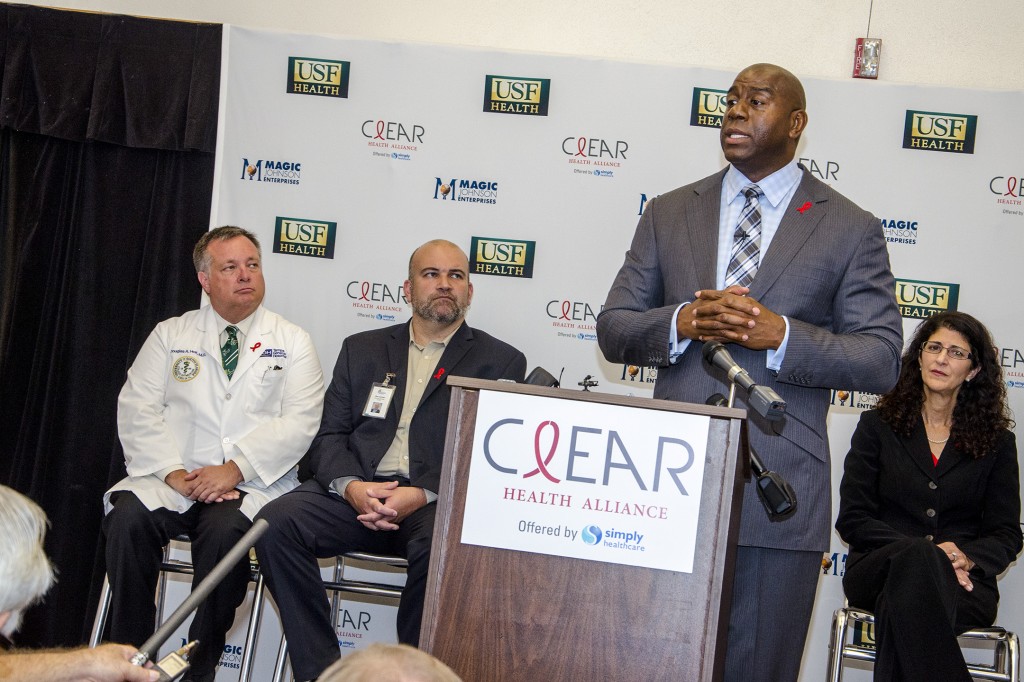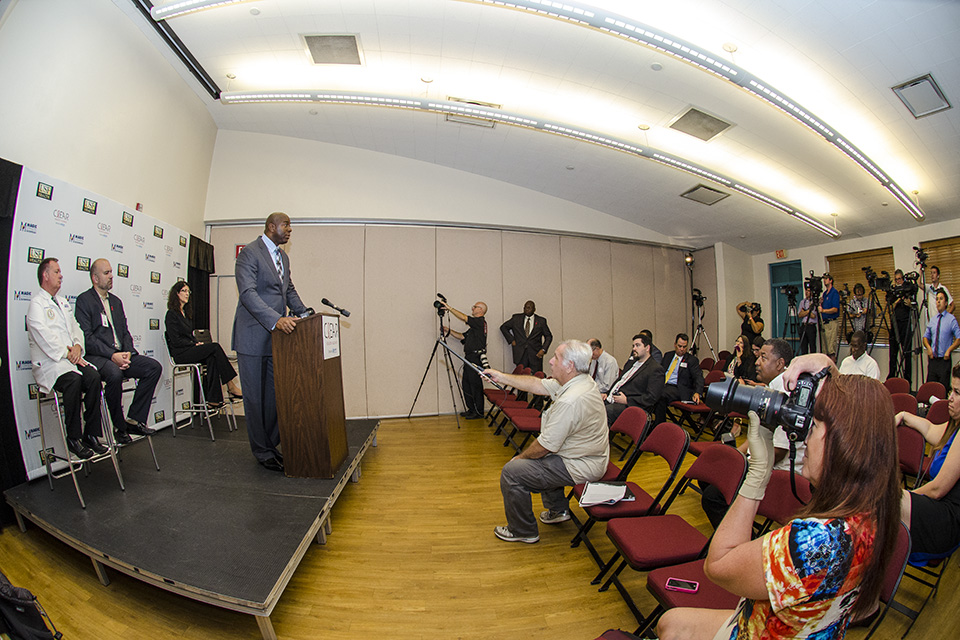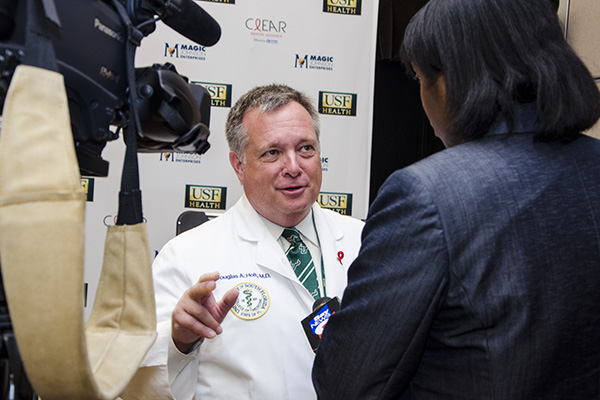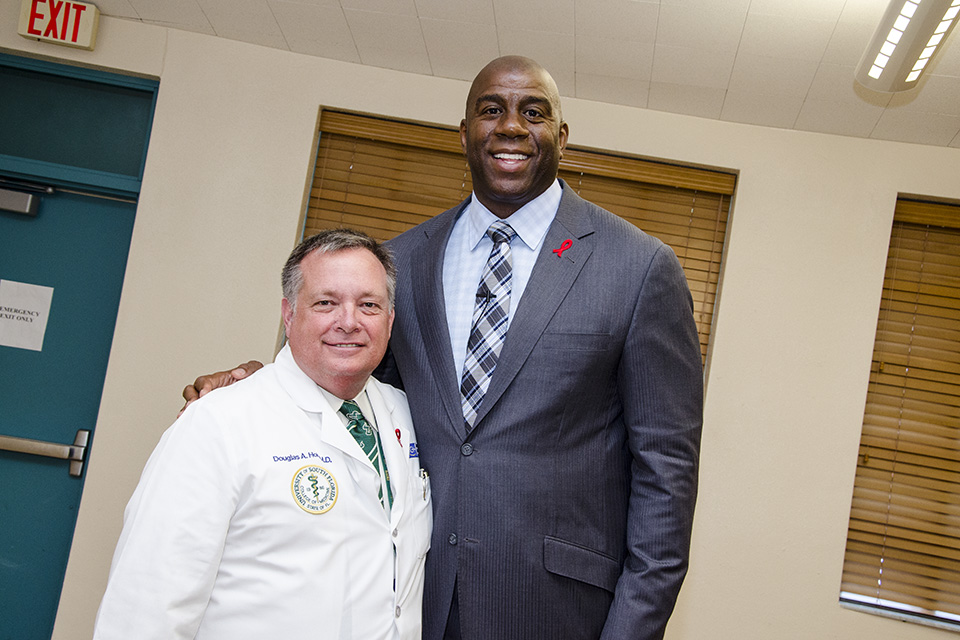A new partnership between academic medicine and managed care will help patients with HIV/AIDS across central Florida gain better access to more coordinated and quality care. The USF Health Morsani College of Medicine has partnered with Clear Health Alliance, a Medicaid plan, to provide care that helps meet the more comprehensive and specialized needs of HIV patients’.
Helping to spread the message of improved care is basketball legend Earvin “Magic” Johnson, who was diagnosed with HIV 22 years ago and now works to advocate and educate on issues of HIV/AIDS.
“We need partnerships like this to help bring (infection) numbers down and we need these places to be in the heart of the communities that need them,” Johnson said at a press conference announcing the partnership held Sept 17 at the University Area Community Center, near USF.

Earvin “Magic” Johnson (at podium) speaks to reporters with, from left, Dr. Douglas Holt, director of the USF Division of Infectious Disease and International Medicine and director of the Hillsborough County Department of Health; Dan Jurman, executive director and CEO of the University Area Community Development Corp.; and Marianne Finizio, executive vice president of Clear Health Alliance.
The new program will make use of the extensive network of specialists in the USF Division of Infectious Disease and International Medicine, with USF faculty physicians providing the primary care for Clear Health Alliance HIV/AIDS patients visiting the Hillsborough County Health Department Specialty Care Clinic.
Clear Health Alliance already partners with the University of Miami and reaches residents in three south Florida counties. The new partnership with USF Health came about after the Agency for Health Care Administration approved Clear Health Alliance for expanding services from south Florida to include the eight counties stretching across the central part of the state, including the Tampa Bay area.
“This is an important day,” Marianne Finizio, executive vice president of Clear Health Alliance. “We’re launching an alliance with the Morsani College of Medicine at USF with the goal of providing this population access to care. We’re truly excited about this expansion with USF and committed to serving this population.”
USF’s reputation gor excellence in HIV research and care, along with being the only academic medical center in the region, made it the right partner for this new program, said Douglas Holt, MD, director of the USF Department of Internal Medicine’s Division of Infectious Disease and International Medicine, and director of the Hillsborough County Department of Health.
“USF has been a longtime academic leader in advancing HIV research and care, including contributing to discoveries that have led to more effective antiretroviral therapies,” Dr. Holt said. “We work closely with our community partners so anyone who is afflicted can get care. And while we’ve learned a lot so that people can survive, they have gone from surviving to thriving.”
The reasons for choosing the program’s partners and basing it in Tampa also point to need. The area surrounding the University Area Community Center is impoverished, with 96 percent of the residents considered low income, averaging an annual income of only $9,500, said Dan Jurman, executive director and CEO of the University Area Community Development Corp.
“Events that are a struggle to others are devastating to these residents,” Jurman said. “And the number of cases of HIV in this area is only a little worse than those in Somalia.”
Twelve percent of Florida’s residents diagnosed with HIV live within the slightly more than 3 square miles surrounding Tampa’s University Area Community Center, near the University of South Florida.
Clear Alliance is the first and only Medicaid plan in the region with a designated specialty for HIV/AIDS. Plan members receive care from providers trained for HIV/AIDS care, as well as services from individually assigned, experienced HIV/AIDS care coordinators who guide them in their medical treatment and provide assistance in meeting other needs specific to their disease.
Johnson, who is an investor with Simply Healthcare, the parent company of Clear Health Alliance, works to ensure medical services reach ethnically diverse urban communities with high rates of new cases of HIV/AIDS.
Closing the press conference, Johnson said “I’m so impressed with this (University Area) Community Center, and with Dr. Holt and what he’s doing. It takes all of us to drive these numbers (of infections) down. But we still have a problem of people getting tested, so there much more work we still have to do. No one group can bring these numbers down. You have to come together and work together.”
When asked how he’s feeling and coping with this chronic disease, he smiled and said, “I take my meds, have a positive attitude, love to work out, and I have a grip on my condition. I’m going to live with HIV the rest of my life. Life for me is wonderful.”
Story by Sarah A. Worth, USF Health Office of Communications
Photos by Aimee Blodgett, University Communications and Marketing




